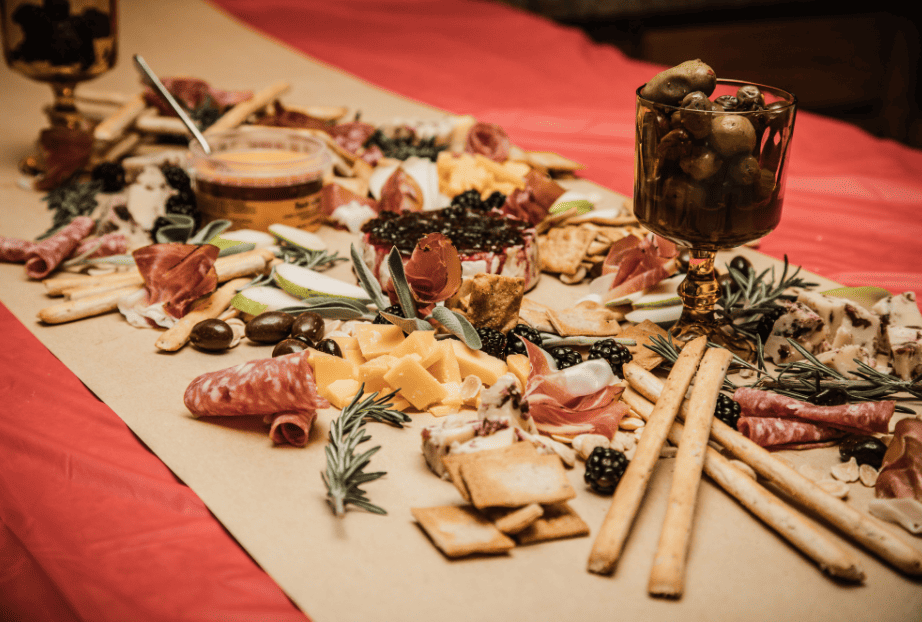
Whether you call it a cheese board, charcuterie board, or a grazing table, there’s no denying that displays full of cheese, meat, and other tasty treats are having a moment.
During the pandemic, charcuterie boards surged in popularity, taking social media by storm as creators showcased their elaborate arrangements of fruits, meats, and cheeses.
One prominent online personality is Southern California-based Emmy Rener—@sophisticatedspreads on TikTok—who is celebrated for creating beautiful and extravagant spreads. Recently, Rener posted a video showing off one of her larger installations: a $7,000 25-foot grazing board commissioned for a 150 person engagement party.
The video has amassed over five million views and has prompted many to question how a collection of meats and cheeses could warrant such a staggering cost.
The post has received over 3,000 comments, with some users accusing Rener of overcharging for her services. One user said, “even after this video, we don’t know what a 7K cheeseboard looks like.” And another saying she must have made a “$6,200 profit?”
Other users—who seem to know the value of high quality products—came to Renner’s defense in the comments, “Y’all don’t realize just how expensive cheese can get and it shows.” With another remarking that, “not all meat and cheese cost the same…the good stuff is $$$.”
Sticker shock is fairly common in the cheese industry. Many people are surprised when they find out how much a wedge of high-quality artisan cheese costs, so it’s no surprise that people on the internet were blown away by the $7K price tag.
“I would argue the most important part of a cheeseboard grazing table is the cheese itself, and I pride myself in sourcing the highest quality cheeses for my clients. People are accustomed to grocery store prices and cheeses, but I aim to create a one-of-a-kind table with cheeses flown in from around the world,” said Rener.
In response to the outcry, Rener shared a series of videos breaking down her costs for the $7K board. The total cost of raw materials and travel—the installation required Rener and one employee to travel across the state and book overnight accommodation—was $2,900. Which, according to fellow cheese board artisan and cheese shop owner Ashley Grant (Bountiful Boards in Green Bay), seems to be “on par for that size group with all contributing factors.”
While that might seem like a lot of profit, the $2,900 does not include labor or overhead costs, two very important—and often overlooked—components to take into consideration when pricing.
In another response video, Rener shared her first-ever cheese board installation to show how far she has come in terms of her craft and her business savvy.
“In the beginning, I remember charging basically food cost and then some, because I would come up with a million reasons in my head why “x” pricing was too expensive, and I didn’t deserve to earn that much,” reflected Rener. “Overtime, I realized if I continued charging that low of an amount, I would virtually be at a loss for the business overall so the rubber met the road.”
IT TAKES A VILLAGE
As many small business owners know, pricing goods and services is a learning curve, and it’s common for people to undervalue their time as they start.
Morgan Schroeder, owner of Martha’s Vineyard Cheesery in Vineyard Haven, Mass., is cheese board artisan who relates to Rener’s pricing struggles.
“The hardest thing for me to contend with is overhead costs related to preparing and producing large, on-site catering installations,” Schroeder said. “Food costs are one animal, but they’re relatively straightforward.”
Schroeder went on to elaborate: “the big thing that people don’t see or don’t understand is the amount of planning that sometimes go into these things. How much back and forth did you have with the client? Did you have to invest in additional serving equipment or props? Is there a vibe or aesthetic that you’re trying to adhere to? What’s the overhead associated with your prep space (rent, utilities, labor)? Are there transportation and delivery costs associated with the installation? So many questions beyond just ‘cheese costs me X and I resell it for Y.'”
Grant said new business owners shouldn’t be afraid to ask for help from their local community. “My advice to anyone starting out [is to] bounce your ideas off as many like-minded, savvy business owners as you can. When it comes to pricing specifically, don’t underestimate your worth and your talent. Trust yourself with the pricing that makes sense, you are in business to stay in business, don’t apologize for it!”
Schroeder stressed the importance of tracking time. “All the time associated with planning and prep, not just set-up time. Even if you aren’t “paying yourself” for these activities per se, you still need to know how many hours are required to produce these offerings so you can price accordingly!”
But perhaps most importantly, new business owners should remain confident in the services they provide and stay true to their passion. Reflecting on her journey, Rener said, “I think it took a while for me to feel confident in charging what I do, but I also think that is the case with anything. I have honed my craft, and after 100 grazing tables I know what I’m doing is unique and truly priceless.”
Nothing exemplifies that confidence more than Rener’s response to this “cheese board controversy.” When confronted with detractors, Rener defended her craft, pricing structure, and business model.
When asked if she had any advice for fellow small business owners, Rener advised them to, “take comfort in knowing that if people are vocal about you overcharging, then they probably aren’t your prime demographic. Furthermore, you can charge whatever you want and if people are buying it and your clients are happy, then you’re doing something right! Do what you know how to do well, and drown out the background noise!



